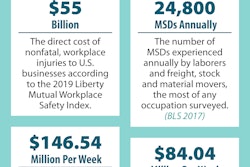
The modern economy relies on global supply chains moving materials, components and finished products around the globe. However, it is not always easy for companies to comply with social standards and human rights in their supply chain network while the consequences of failing to do so are increasingly severe: Human rights violations in supply chains can not only cause a blow to a company’s reputation or result in costly liability exposures, but could also bring potential lawsuits, shareholder class actions and even personal accountability for directors and officers (D&Os).
Human exploitation takes many forms – ranging from forced labor to modern slavery to trafficking to children in employment. An estimated 40.3 million people are trapped in modern slavery globally, according to the International Labor Organization’s (ILO) Global Slavery Index 2018, emphasizing the need for large organizations to focus on this potential risk in supply chains.
Industries such as textiles, food and agriculture, electronics, construction and hospitality are especially vulnerable. According to the UN’s Guiding Principles on Business and Human Rights, businesses, irrespective of size or sector, must not violate human rights and must address actions when they occur.
The regulatory landscape to curb violations runs the gamut from countries with progressive compulsory statutes – the Netherlands, U.S., UK, Sweden and Belgium – to those that have little or virtually no regulatory restrictions at all – the lowest five countries are North Korea, Libya, Eritrea, the Central African Republic and Iran (ILO, Global Slavery Index 2018).
Reputation on the Line
The main threat that a company faces from human exploitation in the supply chain, besides potential liability risks when undertaking business with suppliers, is damage to its reputation. Heightened consumer advocacy, protests and even so-called “public-shaming” exercises, many spearheaded by non-governmental organizations (NGOs) to rally public awareness, make this an increasingly likely prospect for those who fail to comply with required standards. There has even been a rise in targeted civil litigation to combat modern slavery, potentially causing a decline in share price to companies when details of violations are made public.
Shareholders and customers are demanding far more of companies in terms of how they go about their business and conduct themselves. Human exploitation in the supply chain is becoming a boardroom concern and a major exposure for directors and officers – especially for companies in the UK, U.S., EU and Australia. Company boards face the challenge to act appropriately regarding corporate social responsibility and to ensure that suppliers and third-party service providers are similarly compliant.
Protecting Against Liability
Businesses can and should hold vendors and suppliers contractually accountable to fair wages, fair working hours and humane treatment before doing business. By implementing the right checks and balances to address violations, companies can be compliant and forthright to customers, vendors, suppliers and investors, alike.
It is important that organizational leadership from the board level down to middle management fully embrace the need to comply with regulations and even take it upon themselves to self-police their policies and procedures. When an infraction is discovered, businesses must act quickly and state publicly that they won’t tolerate violations of their supplier code of conduct. In addition to proactive risk mitigation, effective crisis response insurance solutions can help mitigate the impact from reputational crisis incidents.
At a time when regulators and investigatory authorities are focusing unprecedented attention on personal accountability for company directors, issues such as slavery in the supply chain can create major problems for senior managers. More enforcement in the area of human rights and holding directors responsible for transparency in supply chains is expected in the future. Corporations that fail to take appropriate steps to eliminate human exploitation from their supply chains may face shareholder derivative suits. Given more and more D&O claims result from reputational events, this concern will not go away and companies need to address it.













